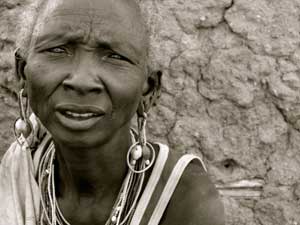About the Pokot
 The Pokot are part of the Kalenjin group of people that lives in an ecological complex region that extends from plains of eastern Uganda across the highlands of north western Kenya to the plains of Lake Baringo. Most Pokot reside in Kenya’s western Pokot district, an administrative unit of approximately 9135 square kilometers. West Pokot is the northmost district in the Rift Valley province. The Pokot are kalenjin speaking (ng’ala Pokot, “ tongue or language of Pokot”) and incorporates words from the neighboring Karamojong and Turkana. The Kalenjin consist of eight principles groups; the keiyo,kipsisgis,marakwet,Nandi,Pokot,sabaot,terik and tugen.
The Pokot are part of the Kalenjin group of people that lives in an ecological complex region that extends from plains of eastern Uganda across the highlands of north western Kenya to the plains of Lake Baringo. Most Pokot reside in Kenya’s western Pokot district, an administrative unit of approximately 9135 square kilometers. West Pokot is the northmost district in the Rift Valley province. The Pokot are kalenjin speaking (ng’ala Pokot, “ tongue or language of Pokot”) and incorporates words from the neighboring Karamojong and Turkana. The Kalenjin consist of eight principles groups; the keiyo,kipsisgis,marakwet,Nandi,Pokot,sabaot,terik and tugen.
West Pokot County presents itself as a unique region with a history that always leaves area residents shuddering at the mention of “government”. Right from the colonial era to successive regimes of jomo Kenyatta, Daniel Arap moi and mwai kibaki, the residents have always felt marginalized and discriminated against in the allocation of public resources. As politicians continue to fight for elective posts, the Pokot people go about their daily activities to put food on the table. Ranked 38 out of 47 counties in poverty, transition rate of 60% from primary to secondary, those who are fighting for positions have their work cut out. Nearly 50 years after independence, the resource-rich county is still struggling to measure up to other parts of the county that boasts of clean drinking water, schools, good sanitation, better roads, security and hospitals. For those aspiring for various politics seats in the county, the biggest task will be to remove west Pokot from years of under development largely as a result as a of insecurity and usher in hope for Pokot. Cattle rustling, female genital mutilation (FGM) and conflict with the neighbors such as turkana, marakwet and karamojong in Uganda have turned west Pokot into a pariah, a scenario that has led to poor development. WMK’s long objective also is to help offer educational opportunities whether formal or informal to the Pokot.
The social Value
Though the Pokot consider themselves to be one people, they are basically divided into two sub groups based on livelihood. About 50 % of the Pokot are semi-pastoralist who live in the lower land west north of kapenguria and throughout Kacheliba division and ngingyang division, baringo district. Those people herd cattle, sheep and goats and live off the products of their stock. The other 50% of the Pokot are agriculturalist who live anywhere, conditions is such that farming can be practiced. The homestead is the social center for the Pokot, here a man lives with his wives, each having their own hut. All members of the family live here and the stocks is controlled here at night. The man is the head of the family, telling others what duties they are to perfom.
The position of woman in the Pokot society is weak. A woman has no voice in any public forum and no authority within her homestead. Illness and death are greatly feared among the Pokot. Death is the end of life and there is no after life. Therefore, life is the most important and precious to the Pokot. Much of the religious rituals is involve in warding off illness or in effecting cures.
Religion and churches
Approximately 15 % of Pokot are Christians and the remaining 85 % are traditionalist. Even among the Christians, the traditional religion and worldview is still dominant. There is estimated 15% nominal Christians among the Pokot. Even among the Christians, the traditional religion is still practiced. Most of the Pokot have not responded to the gospel. The evangelization of the Pokot has been characterized by hardships and challenge, from the geography, from the people , from civil administration , from the language itself. The growth of churches and Christian has been slow. Thanks to YWAM Athi river and WMK, churches are beginning to spread to the more interior regions. Just recently, PEFA through the help of WMK and Wildfire ministry USA, a church was planted at Kakleshon to cater for the spiritual need of the bigger population in the area. Two years ago, YWAM Athi river through the leadership of Joram Kingori planted a church at Nyangaita which still exists amidst many challenges. WMK partners with PEFA to help plant as many churches as possible. Through the support of pst John Mills ( Wildfire ministry USA ), three pastors are supported with a monthly upkeep to help them support their families and to help in the running of church programmes.
(Adopted from world missions)
WMK also thanks wildfire ministries USA for all their inkind donations towards the success of the evangelism programme. The ministry donated
• PA system unit (speakers, mixers and microphone)
• Projector
• Power inverter
We give sincere appreciation to wildfire ministries USA and their team of volunteers; Brenden and Kirstin Mills and Andrew for accepting to support the ministry in Pokot and for committing their time and finances to come and spend time in Pokot.
We have 42 guests and no members online
Contact Us
WMK’s field office is based in Lomut,west Pokot.
To contact us ,write to
The director [email protected]
The programmes manager [email protected]
Or Call our Kenyan Numbers +254723712883 &
+254720453556